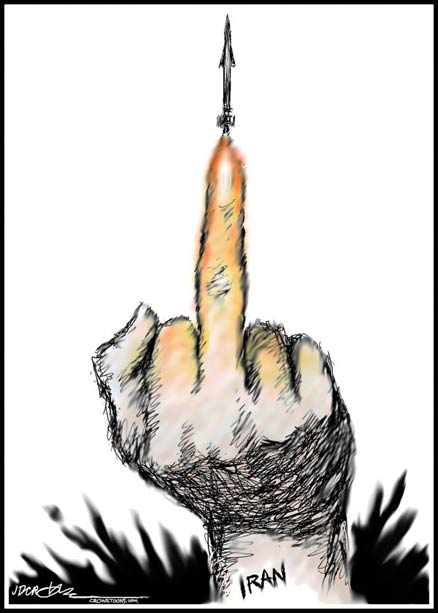
The long-running dispute over nuclear weapons has been displaced by a more immediate drama — the rapidly spreading uprising against the Iranian regime.
"Our focus every day, and the world's focus, is what's happening in the streets of Iran," Secretary of State Antony J. Blinken said.
"We support what Iranians are asking for," he added, saying they wanted "to be heard, to be able to make their views known peacefully, and not to have this terrible repression."
U.S. negotiator Robert Malley added a blunt assessment of the prospects for a revived nuclear arms deal, one of President Joe Biden's longtime foreign policy goals: "It's not on the agenda."
Instead, the U.S. confrontation with Iran has become broader and deeper — a conflict on more than one front.
Let's start with the nuclear standoff. The United States and other big powers have been working for almost two years to revive the 2015 nuclear deal with Iran that President Donald Trump canceled in 2018. The deal put a ceiling on Iran's uranium enrichment program, which produces the basic ingredient for nuclear weapons, in exchange for lifting economic sanctions.
By August, officials on both sides said they were close to agreement. But Iran raised new demands, stalling the deal, U.S. and European officials say.
Then, in September, an unexpected event: Iran's streets erupted in protest after a 22-year-old woman, Mahsa Amini, died in police custody. She had been arrested by Tehran's morality police for allegedly wearing her headscarf improperly.
Angry demonstrations against the regime began among women and girls, and spread quickly. Protesters in Tehran set fire to police stations and called for the overthrow of Ayatollah Ali Khamenei, the country's supreme leader. Police arrested thousands and announced that protesters would be put on trial — some on charges that carry the death penalty.
Iran scholars said the uprising was unprecedented in the era of the Islamic Republic.
"There is a widespread willingness of young Iranians to go to the streets and demand a change of the system … and they're completely undeterred by the use of force," said Suzanne Maloney of the Brookings Institution.
The Biden administration reacted almost immediately, condemning the repression and calling on the United Nations to monitor the Tehran regime's actions.
The United States also relaxed sanctions that restricted exports of communications technology to Iran, to allow Google and other companies to provide tools for protesters to communicate securely.
And the administration announced yet more sanctions against Iranian officials directing the repression.
That may not sound like much, but some normally critical human rights advocates praised the administration for its agility.
"They've done quite a bit," said Ali Vaez of the International Crisis Group.
The sobering fact is that there isn't much the United States and other outside governments can do to help a grassroots uprising in Iran.
As we learned during the Arab Spring that began in 2010, when revolts erupted from Tunisia to Syria, U.S. power to influence events in other countries is limited.
"This is an Iranian drama, and foreigners are merely bystanders," Vaez said.
"The West has used sanctions against Iran for so long that Iran has become numb to them," he added. "They don't provide much leverage."
The uprising has one more effect on U.S. policy: It has made it politically impossible, at least for the moment, for the administration to relax nuclear sanctions.
If the Tehran regime suddenly agreed to sign the stalled nuclear deal, the U.S. would be required to lift many of its economic sanctions against Iran. Billions of dollars in frozen assets would flow into Iran's treasury, and Iran would be free to sell oil in the world market.
"You would have to consider whether you were providing a life raft to a regime that is under fire from its own population," Maloney said.
But that leaves Biden administration officials trapped in a dilemma.
They still want a nuclear deal with Iran; they just don't think they can conclude one now, with a regime under siege by its own citizens.
Meanwhile, Iran announced last month that it had increased uranium enrichment at its underground Fordo plant to 60% purity — a short step from the 90% required for a nuclear bomb. That means Iran would need only a few weeks to assemble a crude nuclear device, U.S. officials say.
That's the spiral of escalation that the nuclear negotiations were intended to prevent.
Without an agreement, Iran will be tempted to use its nuclear program for brinkmanship and barely veiled threats. Israel, under the incoming, more hawkish government of Prime Minister-designate Benjamin Netanyahu, is already renewing talk of a "military option" against Iran. U.S. officials say Biden has that option too.
The nuclear agreement may be off the agenda for now. But the problem it was intended to solve hasn't gone away.
(COMMENT, BELOW)
Previously:
• 09/20/22: Biden sent the wrong message on COVID. He can still fix it
• 09/20/22: Putin's brutality in Ukraine can get worse. Get ready for a chilly winter
• 09/13/22: China's economy is slowing, its population aging. That could make it dangerous
• 06/28/22: To deter China on Taiwan, Biden needs to reassure
• 05/24/22: India has become a US partner in countering China --- a limited partner, that is
• 05/11/22: Slow Joe's premature self-congratulation won't help the US in Ukraine
• 05/03/22: Can the US deter Putin from using his arsenal of battlefield nuclear weapons in Ukraine?
• 04/08/22:Biden's budget is big. Dems will vote to make it bigger
• 03/22/22: Ukraine's resistance offers a useful lesson to Taiwan
• 03/15/22: China wanted to appear neutral between Russia and Ukraine. It isn't
• 02/22/21: Who needs an invasion? Putin's offensive against Ukraine has been underway for a long time
• 02/09/21: If Putin wants an exit from the Ukraine crisis, the offramps are open
• 11/30/21: Biden wants to focus on China. Putin has another idea
• 11/23/21: Our oldest president just turned 79. He might have something to learn from the second-oldest
• 11/16/21: Can Biden and Xi talk their way out of a slide into conflict?
• 10/13/21: Congress has a chance to take bipartisan action on Facebook. Don't let it slip away
• 09/24/21: Can Dems win on crime issues with murders rising? Biden thinks so
• 06/29/21: Can Dems win on crime issues with murders rising? Biden thinks so
• 04/20/21:Afghanistan's war -- and America's stakes in it -- won't end when the troops leave
• 03/31/21: Here's why our new cold war with China could be a good thing
• 02/25/21: Sen. Joe Manchin drives Dems crazy. Here's why they need more senators like him
• 08/11/20: Goodbye to traditional political conventions --- and good riddance
• 05/19/20: We won't end COVID-19 with 'test and trace'
• 04/07/20: Joe Biden is stuck in his basement. It just might help him win
• 03/10/20: Where did Bernie's revolution go wrong?
• 03/05/20: Dems give Trump good reason to smile
• 02/18/20: Who will be the Un-Bernie?
• 02/11/20: Buttigieg wants to be the Goldilocks candidate. It just might work
• 01/21/20: The world according to Bernie
• 09/04/19: Trump's draft deal with the Taliban looks ugly, but it may be the best we can get
• 04/22/19: Something is missing from media-fawning Buttigieg campaign --- his stance on major issues
• 03/14/19: Biden, If He Runs, Will Face A Cruel Irony
Doyle McManus
Los Angeles Times
(TNS)
Doyle McManus is an American journalist, columnist, who appears often on Public Broadcasting Service's Washington Week.


 Contact The Editor
Contact The Editor
 Articles By This Author
Articles By This Author